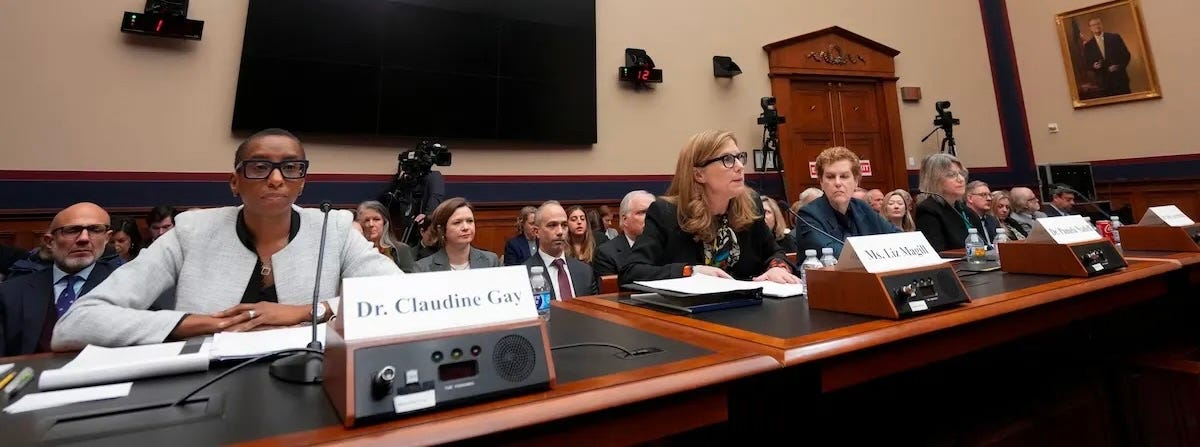Is anti-Zionism antisemitism? Is anti-racism racism? How many deaths add up to genocide? We live at a moment when labels are in the saddle and ride mankind, as Ralph Waldo Emerson might have put it.
The House of Representatives voted this week on whether anti-Zionism was synonymous with antisemitism. The measure passed but split the Democratic party, with 95 Democrats voting aye and 92 answering “present.” Anti-Zionism has been linked to genocide by the reasoning that opposition to the creation, maintenance or expansion of the national homeland of the Jews amounts to a desire to destroy them.
Elizabeth Magill was forced to resign as president of the University of Pennsylvania after she failed to speak out more forcefully against antisemitism. In prosecutorial fashion Elise Stefanik, a member of the House of Representatives from New York, grilled Magill and two other Ivy League presidents about recent demonstrations on their campuses, during which students endorsed Palestinian resistance—intifada—against the Israeli occupation. “And you understand that the use of the term intifada in the context of the Israeli-Arab conflict is indeed a call for violent armed resistance against the state of Israel, including violence against civilians and the genocide of Jews. Are you aware of that?” Stefanik demanded of Harvard president Claudine Gay.
“That type of hateful speech is personally abhorrent to me,” replied Gay.
“And there have been multiple marches at Harvard with students chanting, quote, There is only one solution intifada, revolution, and, quote, globalize the intifada. Is that correct?”
“I’ve heard that thoughtless, reckless and hateful language on our campus. Yes.”
“So based upon your testimony, you understand that this call for intifada is to commit genocide against the Jewish people in Israel and globally,” said Stefanik. “Correct?”
“I will say again, that type of hateful speech is personally abhorrent to me.” Gay didn’t want to accept Stefanik’s equating of intifada with genocide. But neither did she wish to seem soft on genocide. She lost this battle but as of December 11 has kept her job. Magill fared worse.
There’s a straightforward solution to the problems created by the use of labels of this sort: Stop using them.
This solution won’t be embraced by those bent on picking fights. They prefer the problems to solutions. “Anti-Zionist” lacks the emotional shock value of “antisemitic.” An Ivy League president might survive being called the former but likely not the latter. Tolerating shouts for intifada won’t get her fired, but appearing to countenance genocide probably will.
We’ve heard this before, although more from the other side of the political spectrum. Amid the Black Lives Matter protests in 2020, individuals who insisted that “all lives matter” were castigated as racists. Opponents of affirmative action have long been labeled white supremacists. In both cases, the political purpose has been to tar all opponents of a policy or position with the broadest brush possible.
We can’t reasonably expect better behavior from politicians, whose incentive structures reward posturing. Yet we can do better ourselves. The Hamas attack of October 7 was heinous not because it was—or wasn’t—genocide against Jews but because it included the murder of more than a thousand noncombatants. The subsequent offensive by the Israel Defense Forces is blameworthy not because it is—or isn’t—genocide against Palestinians but because it’s producing civilian deaths far beyond reasonable collateral damage. The use of excessive force by police is wrong not because policing is—or isn’t—systemically racist but because it kills people who shouldn’t have been killed.
Labels lump victims together, often for political convenience. The lumping offends the truth; it can also diminish the victims by eliding their individuality. The story of Anne Frank is so wrenching because we get to know the girl who will perish at Bergen-Belsen. Is a charge of genocide more appropriately serious than six million counts of murder?
Labels are sometimes necessary; they let us impose conceptual order on an unruly world. But when they confuse rather than reveal, we’re better off without them.




I Liked this line: This solution won’t be embraced by those bent on picking fights. They prefer the problems to solutions.
But with regards to the BLM and All lives matter retort- whether those that said "all lives matter" were racist or not, they were insensitive. According to Mapping Police Violence, a nonprofit group that tracks police shootings, Black people, who account for 13 percent of the U.S. population, accounted for 27 percent of those fatally shot and killed by police in 2021.
Saying "all lives matter" was a means to attempt to delegitimize the issue of REAL grievances on the part of a segment of our society. Yes all lives do matter, but for a portion of our population, some matter less than others.
A very welcome, level-headed analysis.